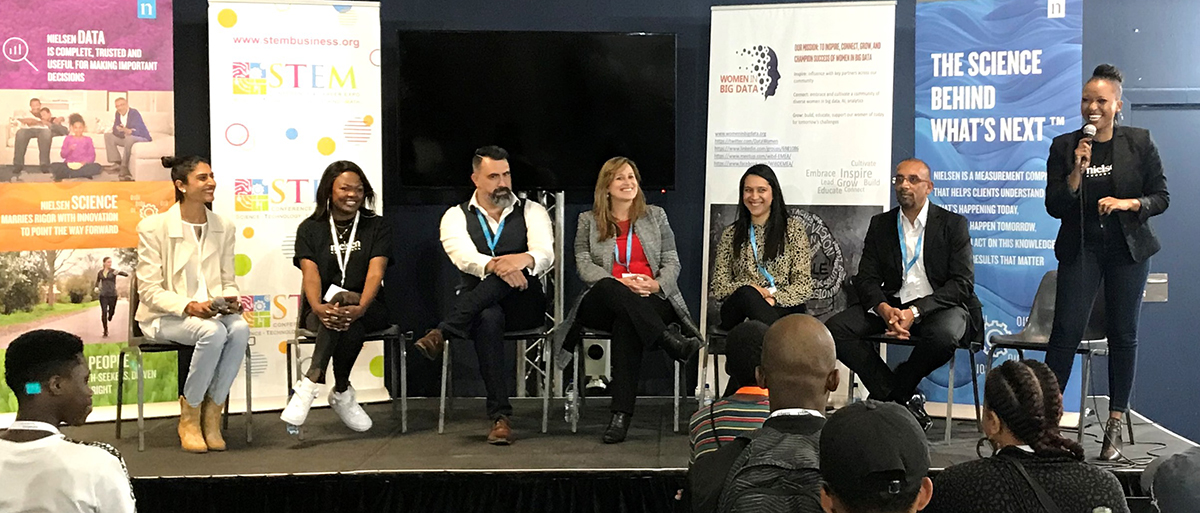
The Fourth Industrial Revolution (4IR) is fundamentally changing the world around us, and technological advances like artificial intelligence, machine learning and digitization are increasingly affecting how we live, work, communicate, learn and play.
Against this backdrop, the science of data analytics is the “gold rush of the modern age,” where businesses are using technology to mine valuable information to better understand consumers and then develop products and services that cater to their unique needs. Within this evolving scenario, the big questions are: “What role will people play in the extraction of actionable data?”, and “Which careers are being created as a result of these expanding possibilities?” These were key questions discussed during Nielsen’srecent The 4th Industrial Revolution is Arriving panel at the Science Technology and Maths Conference (STEM) in Northgate, Johannesburg.
Speaking at the event, Nielsen Africa & Middle East Data Science Lead Jason Naicker said, “Within the context of the 4IR, machine learning has automated repetitive, time-consuming tasks, which include data gathering. But collection of information is only one aspect of this data revolution. The important question is, ‘What type of analysis and insight is required to apply meaning to that information?’ This is where humans can teach machines to translate inputs from the physical world into usable information.” He added, “I like to describe it as employees becoming the ‘DaVincis of data’! We’re all becoming ‘artists’ by creating and shaping information for a better business bottom line.”
Jason pointed out, however, that companies can only meaningfully translate data from the real world into actionable opportunities when they design their workplaces to be more humanistic and creatively orientated.
The power of people
Also speaking at the event, Nielsen Sub-Sahara Africa HR Director Maya Govind said that 4IR has emphasised the importance of diversity and the inclusion of a variety of thought, experiences, skills and backgrounds in the talent mix. “We are a global measurement and data analytics company, but our business is not only about the numbers; it’s also about understanding the people behind those numbers. For this reason, we don’t only look at science and math qualifications in prospective employees. We also value diverse skill sets, including degrees in psychology and sociology, which have a huge relevance to the day-to-day work at Nielsen.”
Maya stressed that companies need to appreciate the difference between technical competencies and behavioural competencies. “Technical skills are transient skills—they come and go and change all the time. You need deep, humanistic skills of understanding, empathy and human-based analysis. As a result, emotional intelligence (EQ) has gained more attention in recent years and is one of the critical skills in the 4IR. This is underpinned by key skills like complex problem solving, critical thinking, creativity, people management, judgement and decision making, negotiation and cognitive flexibility.”
On the subject of machines replacing human labor within a 4IR world, Maya commented, “It’s important to understand that this won’t mean fewer jobs for humans, but rather different ones. In fact, most of the jobs that our current generation of pre-school children will go into don’t even exist yet. So is there longer-term job stability? Maybe not. But will there be jobs? Absolutely, but they will require the evolution of current skill sets.”
The ‘Gamification’ of learning
Maya also discussed how Nielsen has embraced the latest 4IR technologies in its on-the-job learning initiatives. This includes the concept of “gamification,” which creates a shared, virtual experience of on-the-ground scenarios that allows users to learn faster and in a far more interactive manner.
She clarified, however, that gamification is just one aspect of Nielsen’s approach to learning. “We utilize a variety of learning platforms—virtual and real world—for different types of skills training. Classroom learning, for example, will always have a place. After all, you can’t learn a core capability like leadership on an app!”
In conclusion, Maya noted; “This multidisciplinary approach to learning stems from our aim of providing Nielsen employees with the experience and training to prepare them to take on progressive levels of responsibility and complexity and achieve their full potential in this new world of data, insight and analysis.”
